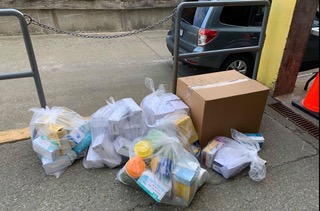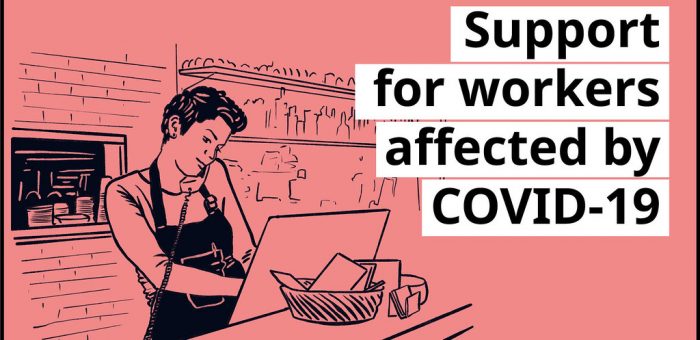Issues & Community Blog - Andrew Weaver: A Climate for Hope - Page 9
Island Medical Program students stepping up in response to COVID-19
Over 60 Island Medical Program students are participating as volunteers in a student-led initiative to serve the community in response to the COVID-19 pandemic. They are providing a number of key services in our community, including:
- Contactless grocery delivery to seniors
- Assisting GPs with wellness phone checks with vulnerable patients
- Helping an inner-city response team respond to support our homeless population
- Childcare and pet care for front line workers
- Collecting PPE donations for Island Health
- Volunteering with UVic’s 3D printing of face shields for front line workers
 Madelaine Beckett (Class of 2021) began working with Jesse Spooner and Amy Kim (Class of 2020) to coordinate the outpouring of requests from students for opportunities to get involved supporting the community. Their early work included childcare, pet care and running errands for front line healthcare workers. Thanks to their early efforts, the initiative quickly expanded as new ideas came on board. Max Moor-Smith (Class of 2020) joined to lead an initiative to collect personal protective equipment and support the 3D printing project at UVic.
Madelaine Beckett (Class of 2021) began working with Jesse Spooner and Amy Kim (Class of 2020) to coordinate the outpouring of requests from students for opportunities to get involved supporting the community. Their early work included childcare, pet care and running errands for front line healthcare workers. Thanks to their early efforts, the initiative quickly expanded as new ideas came on board. Max Moor-Smith (Class of 2020) joined to lead an initiative to collect personal protective equipment and support the 3D printing project at UVic.
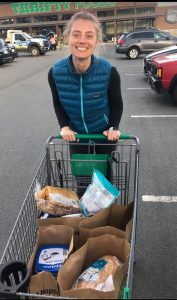 Emily Lerhe and Caroline Spaner (Class of 2022) are leading a project called Bag Half Full to provide grocery delivery to seniors. There are now about 20 volunteers doing the shopping and deliveries. This was modeled on a project started at the University of Alberta, which has now expanded to other campuses across Canada.
Emily Lerhe and Caroline Spaner (Class of 2022) are leading a project called Bag Half Full to provide grocery delivery to seniors. There are now about 20 volunteers doing the shopping and deliveries. This was modeled on a project started at the University of Alberta, which has now expanded to other campuses across Canada.
Madelaine Beckett and Jesse Spooner and two others from the Class of 2021 (Emma Woo and Rita Wakelin) have been working to provide administrative support to the Victoria Inner City COVID-19 Response Team, a physician led group working to address the dual crisis of homelessness and COVID-19. In addition to the administrative work, they have recruited volunteers for assembling donated cell phones with SIM cards and software to support healthcare outreach to this vulnerable community.
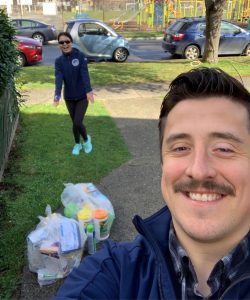 Other students have returned to work in their pre-medical school careers as paramedics and nurses. Many students are engaged in research projects dealing with COVID-19.
Other students have returned to work in their pre-medical school careers as paramedics and nurses. Many students are engaged in research projects dealing with COVID-19.
We are fortunate and grateful for the tremendous efforts of the Island Medical Program students. Thank you for stepping up so quickly to respond to the needs of the community. You have made a huge difference in the lives of so many people.
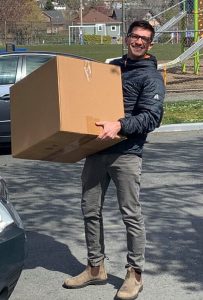 The Island Medical Program delivers the UBC MD program in collaboration with UVic and Island Health. Based on UVic campus and at affiliated healthcare centres across Vancouver Island, the program was created in 2004 to help address regional shortages of physicians, particularly in remote, rural and indigenous communities.
The Island Medical Program delivers the UBC MD program in collaboration with UVic and Island Health. Based on UVic campus and at affiliated healthcare centres across Vancouver Island, the program was created in 2004 to help address regional shortages of physicians, particularly in remote, rural and indigenous communities.
Both CHEK TV and the Oak Bay News have covered the remarkable, and selfless, contributions of these young medical-professionals-in-training.
On the gaps that exist in economic supports available to individuals & businesses during the COVID-19 pandemic
Without a doubt, British Columbia has led the way in North America in terms of introducing measures to curb the spread of the COVID-19 virus in our province. We are very fortunate that so many people are following the advice of Health Minister Adrian Dix and Provincial Health Officer Dr. Bonnie Henry. Thank you to all for staying the course during these difficult times.
Nevertheless, with Canada just over one month into a nationwide lock-down we are beginning to get a better idea of where the gaps are in the existing economic supports and where further relief is needed. Since many of the initial government interventions were broad in scope, needs specific to different industries have been left unaddressed by the existing programs. In BC, a BCC survey found that the current programs were of little use to one third of businesses, with nearly half of businesses with under five employees reporting that they do not find the existing programs to be helpful. Ongoing email exchanges and conversations with British Columbians have also revealed additional gaps in the existing programs. Some of these are highlighted below.
The Tourism Industry is Reeling
Unsurprisingly, sectors dependent on in-person interactions such as the hospitality and tourism industries have been among the hardest hit by the pandemic. For many businesses in the tourism industry, capital expenditures are typically made during the off-season and are offset by revenue generated throughout the summer months. However, the combination of social distancing measures, travel restrictions, and the closure of BC Parks and Natural Reserves has meant that tourism operators have been forced to grapple with hundreds of last-minute cancellations just as their busiest season was about to begin. With many businesses needing to service pre-existing debt loads, the loss of summer revenue has placed them in a precarious position. Exacerbating matters is the fact that many operators have had limited success in negotiations with travel insurance companies around the reimbursement of guests’ travel costs.
Currently, the economic supports introduced by the federal and provincial governments do not adequately address the scale and scope of the challenges that the industry faces, particularly given its seasonality. Assistance offered by the private sector such as deferring loan payments for three months are only stop-gap measures because payments will eventually come due. Additional solutions proposed to address the issues the tourism and hospitality industries are facing have included altering the terms of the existing loan programs to provide longer repayment periods, larger loan guarantees, and determining loan eligibility on a per property basis rather than a per owner basis.
Rent Assistance
One concern common to both individuals and businesses is the ability to pay rent. Even before the current economic crisis began, the high cost of living in urban areas was a pressing issue in federal and provincial politics. Rent prices have been increasing over the last decade and as of November 2019 the average rent in Vancouver was $2,507 per month. In Oak Bay, just under 20% of households fall below the affordability standard, defined as spending 30% or more of income on shelter costs.
Although Ottawa and Victoria have stepped in to provide the Canada Emergency Response Benefit (CERB) and the BC Temporary Rental Supplement Program (BC-TRS) respectively, many individuals have indicated that the existing supports will not be enough to get them through the crisis, particularly given the fact that relief from other recurring expenses such as mortgage payments, property taxes, utility bills, and debt payments are only temporary. If people are unable to make rent payments, hundreds of tenants could be facing eviction when the crisis is over. The impact of missed rental payments would also be acutely felt by landlords, many of whom are reliant upon rental income to make mortgage payments or to support their retirement.
On a commercial level, almost 60 percent of Canadian small businesses have said that they will be unable to pay rent come May 1st. The situation is particularly urgent in the food service industry where three quarters of respondents to a Restaurant Canada survey reported that that rent was a primary source of business debt.
Solutions floated to the issues facing renters and landlords have included increasing the provincial rent supplement, and federal government intervention to support renters by topping up the CERB payment. The recently announced Canada Emergency Rent Assistance program should provide much needed relief to small businesses but will need to be closely monitored to determine if it is ambitious enough. Many small business owners have expressed their reluctance to take on more debt and may require further support in the weeks ahead.
Ongoing Restrictions to the Canada Emergency Wage Subsidy
While making the criteria for the Canada Emergency Wage Subsidy more flexible has helped more businesses qualify for the program, many firms have indicated that they are still slipping through the cracks. Currently, only one third of businesses in BC are confident that they will qualify for wage subsidy, with 28% of businesses reporting that their revenue has not declined enough to meet the eligibility requirements. This issue is particularly pressing for businesses that have experienced revenue declines but are still trying to stay open to provide services to customers. Without additional support many of these businesses will be forced to close and layoff their employees, making an eventual economic recovery all the more difficult.
Unaffordable Childcare Costs
Both the province and the federal government have taken steps to ensure that essential service workers are able to access child-care throughout the pandemic. At the federal level, the CERB has been extended to those forced to care for their children at home and the Canada Child Care Benefit has been increased by $300 per child. In BC, the provincial government has prioritized spaces in child-care centres for essential service workers and has provided access to child-care services for school aged children through schools themselves. Yet despite these measures, essential service employees with children above the age of five are still struggling to find affordable child-care services. In some school districts, schools no longer have the capacity to offer child-care, forcing parents unable to work from home to resort to private options. For many households, the costs of private child-care are too high to remain a viable long-term solution to the lack of in-school supports.
Throughout the pandemic, essential service employees have been deservingly lauded as heroes for their selfless commitment to others. With some of these workers still struggling to find affordable child-care for their children, Ottawa and Victoria need to address the gaps in the existing support network so that workers in essential industries can continue to provide the services that British Columbians count on. If further support does not come soon, essential services workers may be forced to quit their jobs to care for their children at home.
Possible options here could include extending childcare services to out of district students if there are enough spaces available, distributing additional tax credits to families, or making the criteria for the CERB more flexible to cover a portion of the costs of childcare for essential service workers.
Supporting Individuals and Businesses
At the moment, there is a narrow window of opportunity for governments to act to aid struggling sectors and individuals. Many businesses are dangerously close to being forced to permanently close and cannot wait much longer for further assistance. Going forward, the government might focus on ensuring that as many individuals and businesses as possible can access their programs. Given the consequences of not doing enough, I am of the view that it is is better to do too much than to do too little.
Celebrating Earth Day during a global pandemic lock down
As we celebrate the 50th anniversary of Earth Day we recognize that we live in a world that is vastly different from what it was even just a few months ago. For the first time, Earth Day will be celebrated without large outdoor events where we come together and share our vision for a sustainable future. Instead, millions of people will come together via online platforms and global events featuring today’s scientific experts, thought leaders and our creative communities. Earth Day has been re-imagined by necessity due to the current crisis we all face.
The COVID-19 global pandemic has changed our lives profoundly and destabilized our economy in an unprecedented manner. Yet in every crisis, there is also opportunity and, in this crisis, we have an opportunity to rethink our way of life and how we live on this planet.
Although separate issues, there are parallels that can be drawn between the pandemic and the climate crisis. Both are global and require evidence-based solutions grounded in science. Both have laid bare the deficiencies and inequities in how we protect the most vulnerable in our society. Both require bold political leadership in a changing, threatened world.
Here in British Columbia, the response of our public health officials and the government to the COVID-19 crisis has shown our province to be a leader in acting quickly to avoid worst case scenarios. Strict measures like social distancing and non-essential business closures which were implemented early in BC appear to have ‘flattened the curve’. There has been a high degree of compliance to these measures and an outpouring of support in the community to assist those most vulnerable. While we are encouraged by the data we have seen, this is no time to let down our guard and relax the strict measures too quickly. Other jurisdictions in the world have shown that this has serious and life-threatening implications.
British Columbia has also proven to be a leader in response to climate change. We are well positioned to lead into the 21st century with CleanBC, the new economic vision for how BC will prosper in a changing and challenging world.
In the context of responding to the pandemic, we have an opportunity to embrace a new approach to transitioning the economy. While the pandemic has had a devastating effect on the economy due to radical business and industry shutdowns, there has been an unintended, but beneficial consequence of a sharp drop in global greenhouse gas emissions. As the economy revives, we have a chance to reset priorities and move more quickly to renewable resources as a cost-effective solution to fossil fuels. The major disruption caused by the pandemic is an opportunity to make transformational change for a cleaner, healthier future.
While the pandemic has appeared as a clear and present danger that will play out over weeks and months, the climate crisis is an existential threat that has been playing out over decades. The radical economic measures taken in response to the pandemic are not the way to combat climate change, however we have an opportunity to rethink our behaviour and approach to transitioning the economy for the long term. We have come together in new ways to fight the pandemic. Perhaps we can emerge with a deeper understanding of our interdependence as a global community. Something to ponder on Earth Day 2020.
Resources for those facing economic hardship during the COVID-19 Pandemic
Click Here to Download Guide to Accessing COVID-19 Supports for British Columbians
- Island Health updates: https://www.islandhealth.ca/news/news-releases
- BC Centre for Disease Control: http://www.bccdc.ca/health-info/diseases-conditions/covid-19
- BC Government News website: https://news.gov.bc.ca/
- Government of Canada Public Health Agency: https://www.canada.ca/en/public-health.html
- BC Hydro COVID-19 Customer Assistance Program: https://www.bchydro.com/news/conservation/2020/covid-19-updates.html
- MP for Nanaimo-Ladysmith Paul Manly and MLA for North Vancouver-Lonsdale Bowinn Ma have also published useful information on public health orders and the financial supports available to businesses, families, and individuals
Mental health support for frontline health workers & the general public during COVID-19 pandemic
In recent weeks, the strain of the COVID-19 pandemic on our healthcare and economic systems has received no shortage of commentary. Slightly less remarked, on but no less important, are the social and psychological effects of the novel coronavirus outbreak. Most acutely, workers on the front lines of the pandemic have been put in a position that is bound to strain both their mental and physical health. Healthcare providers have been selflessly risking their lives to save others and have directly witnessed the human costs of the pandemic. Those with a family member or friend battling COVID-19 in hospital have been forced to deal with a tremendous amount of stress and uncertainty. Others are in the process of grieving after losing a loved one to the disease.
On a societal level, there are very real psychological costs to the social distancing measures needed to flatten the curve. It is commonly said that humans are a social species by nature, meaning we evolved to live in close contact with others in tight knit social groups. Physical distancing measures work directly against our ingrained sociability by disrupting the meaningful in-person social interactions that form an invaluable part of our lives. Over the past six weeks many Canadians will have likely spent more time alone than at any time during the past six years. While some may find the solitude and isolation to be rejuvenating, others may find that these same situations give rise to feelings of loneliness.
Like many other highly developed countries, the structure of Canadian society poses an unprecedented challenge to our ability to collectively navigate the social consequences of the novel coronavirus. More Canadians now live alone than ever before, making thousands of people vulnerable to feelings of isolation and loneliness. Elderly Canadians and those without the tools to connect with others virtually will find it particularly difficult to combat these emotions.
Of course, physical isolation is not the only source of stress that will challenge people’s mental health throughout the pandemic. For many, reduced income will be a source of profound anxiety and stress as they worry about how they are going to make ends meet. Beyond merely providing people with economic security, work also brings meaning to people’s lives and is a critical part our identities. Without the constant of steady employment, millions of Canadians will likely be experiencing a sense of dislocation and aimlessness.
And although the physical symptoms of coronavirus may discriminate by age, its effects on people’s mental health effects do not. Children and young adults are also vulnerable to depression and anxiety brought about by the COVID-19 pandemic. For youth already dealing with mental health issues, the closure of schools has meant the loss of an important coping mechanism. Grade 12 students are likely wondering how the pandemic will impact their senior year while thousands of young adults are worried about the job market they will be graduating into.
Given the widespread impact of the pandemic on our mental and physical health, this moment demands unprecedented levels of social solidarity from all of us. Many have already risen to the challenge in what some have called the care-mongering movement. Facebook groups allowing people to arrange to deliver groceries to seniors or those in self-isolation were formed just days after the announcement of social distancing measures. Island medical students were quick to offer childcare services to health care workers battling the pandemic on the frontlines. Zoom , Skype or Facetime calls to check in on friends and family have become a regular occurrence. But as the pandemic drags on and more of us get accustomed to our new social reality, we need to ensure that we remain unwavering in our commitment to others. We need to continue to keep the elderly and those living alone emotionally connected to the outside world. We must to continue to respond to requests from charities and community-based organizations when they are made. And we need to continue to check in on vulnerable friends and family members to give them the support they need.
Nonetheless, despite the inspiring levels of social solidarity shown throughout the pandemic, local communities cannot be expected to bear the burden of COVID-19’s social ramifications on their own. It is the responsibility of the government to provide people with the mental health resources they need for the duration of this crisis. To date, governments across Canada and organizations focused on delivering healthcare have stepped up to migrate existing services online and to provide new services where required. If you or someone you know is struggling with mental health issues as a result of the pandemic numerous external supports are available. No one is alone – we are all in this together.
Mental Health Supports During Covid-19
1) Resources Available for anyone
Bc211
Bc211 is a province-wide information and referral service that receives calls from those interested in helping seniors with basic needs such as grocery shopping, pharmacy drop-offs and check-ins. To register for the program, please visit the BC211 website.
BounceBack
Bounceback is a free program which assists adults and youth 15+ dealing with anxiety and depression by giving them the skills and strategies to manage these issues. British Columbians can register for free by visiting the BounceBack website.
Child and Youth Teams
The Ministry of Children and Family development is offering intake services and mental health counselling online and through the phone. To access these services please call your closest Child and Youth Mental Health clinic.
Foundry Virtual Clinic
Foundry is providing youth aged 12-24 with counselling, peer support, primary care, and family support through voice calls, video, and chat. Those interested in accessing these services should visit the Foundry website.
Free Online Mental Health First Aid
The BC Psychological Association is offering mental health support to any BC resident who is experiencing stress, anxiety, or uncertainty as a result of the COVID-19 pandemic. The organization will provide 30 minute telephone consultations to equip people with skills and strategies needed to manage mental stress induced by the crisis.
Here2Talk
Here2Talk provides all students currently registered in a BC post-secondary institution with access to free, confidential counselling and community referral services. These resources are available via app, phone, and the web, and can be accessed by visiting the Here2Talk website.
Living Life to the Full
Living Life to the Full is a Cognitive Behavioural Therapy based course designed to give people the skills needed to cope with stress, anxiety, and depression. The 8-week course is led by a trained facilitator and can be accessed through the Living Life to the Full webpage.
VictimLink BC
VictimLink BC provides immediate 24/7 support to victims of family or sexual violence through the phone. You can call 1-800-563-0808 or email VictimLinkBC@bc211.ca. VictimLinkBC@bc211.ca to get help.
Virtual Counselling Services
Virtual community counselling is available for individuals or groups at low or no cost through the Canadian Mental Health Association.
Y Mind
Offered through the YMCA, Y mind is a seven-week mindfulness program targeted at young adults aged 18-30 experiencing depression and anxiety. Those interested in learning more should visit the BC YMCA website.
Youthspace
Youthspace offers online crisis & emotional support chat for those under 30 years old. They’re open every night from 18:00 to 24:00 PST. For more information, please visit the Youthspace website.
Wellness Together Canada
The federal government has launched Wellness Together Canada to provide Canadians with mental health support throughout the COVID-19 pandemic. The tool gives users access to free online resources, tools, apps, and connections to trained volunteers and qualified mental health professionals. Please visit the Wellness Together Canada website to find out more.
2) Support for Indigenous Peoples
To find out how to access the numerous support services available to indigenous peoples throughout the COVID-19 pandemic please consult the information provided by the First Nations Health Authority.
3) Supports available to Frontline Healthcare Workers
Mobile Response Team
Frontline healthcare workers dealing with mental health challenges as a result of the COVID-19 pandemic are able to get support through the mobile response team (MRT). To access these supports healthcare workers can dial 1-888-686-3032 or email MRT@phsa.ca.
Canadian Mental Health Association Online Resource Hub
The BC Division of the CMHA is planning to provide healthcare workers with an expanded online resource hub which will give them strategies and techniques to improve their mental health and well-being. This resource will be launched April 20, 2020.
Virtual Peer Support Service
The CMHA is planning to launch a phone and text-based peer support service in May 2020 to provide emotional support to healthcare workers. The service will be staffed by former long-term care and home support workers.
3) A List of Useful Articles and Other Resources
- Advice from Anxiety Canada on what to do if you’re anxious or worried about COVID-19
- Advice from BC Mental Health and Substance Use Services on how to support your mental health during the COVID-19 pandemic
- Article from Psychology Today on how to stay emotionally healthy during the COVID-19 pandemic
- A Guide on how to live with worry and anxiety amidst global uncertainty
- Apps to support mental well-being
- Headspace, Ten Percent Happier, Waking Up, Insight Timer, Prana Breath, Healthy Minds
If you are experiencing thoughts of distress, despair, or suicide call the CrisisCentre hotline at 1-800-SUICIDE (1-800-784-2433). If you need emotional support or information about other mental health related resources you can call 310-6789. Indigenous peoples can phone 1-800-588-8717 to access culturally safe crisis support.

